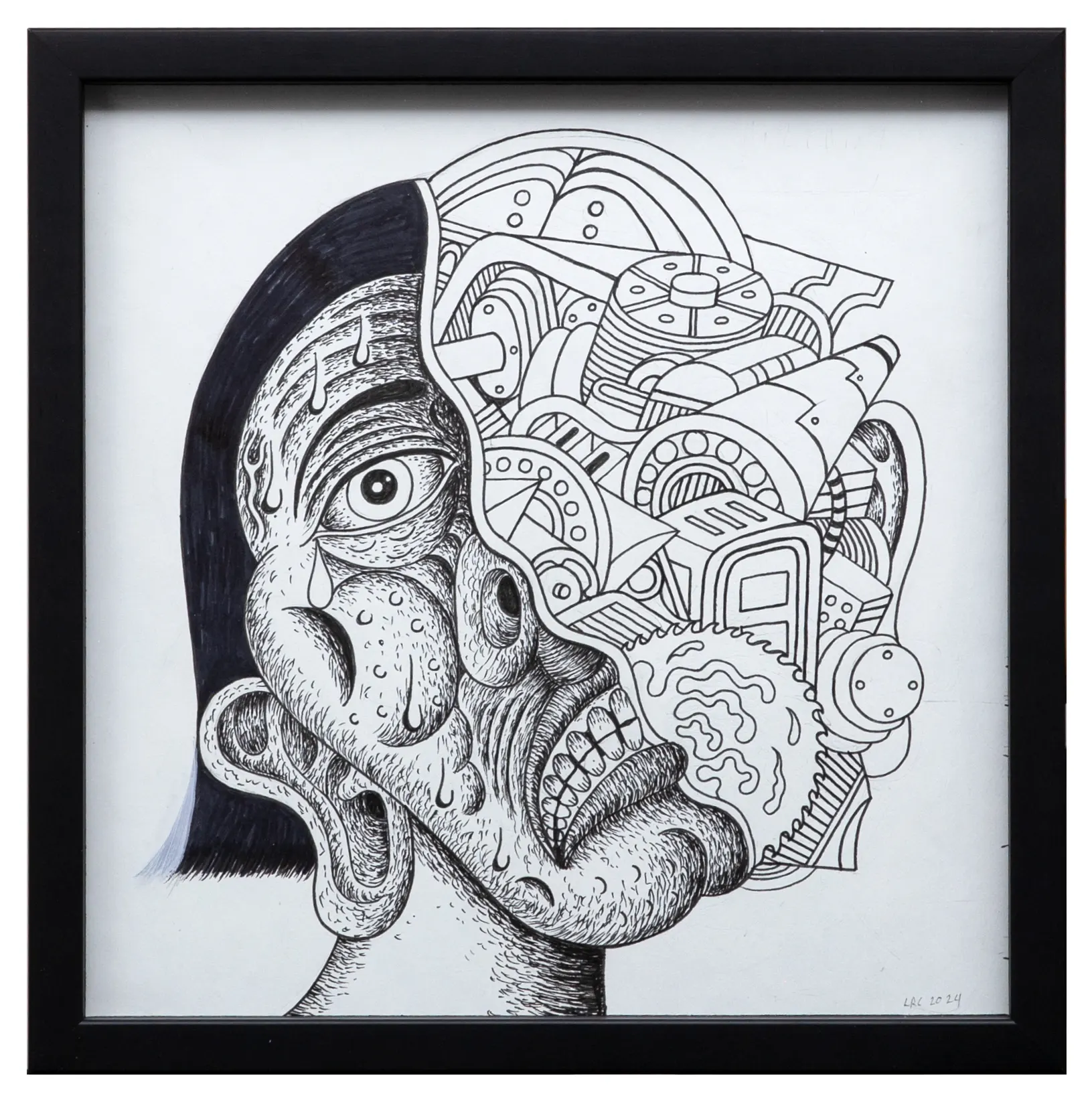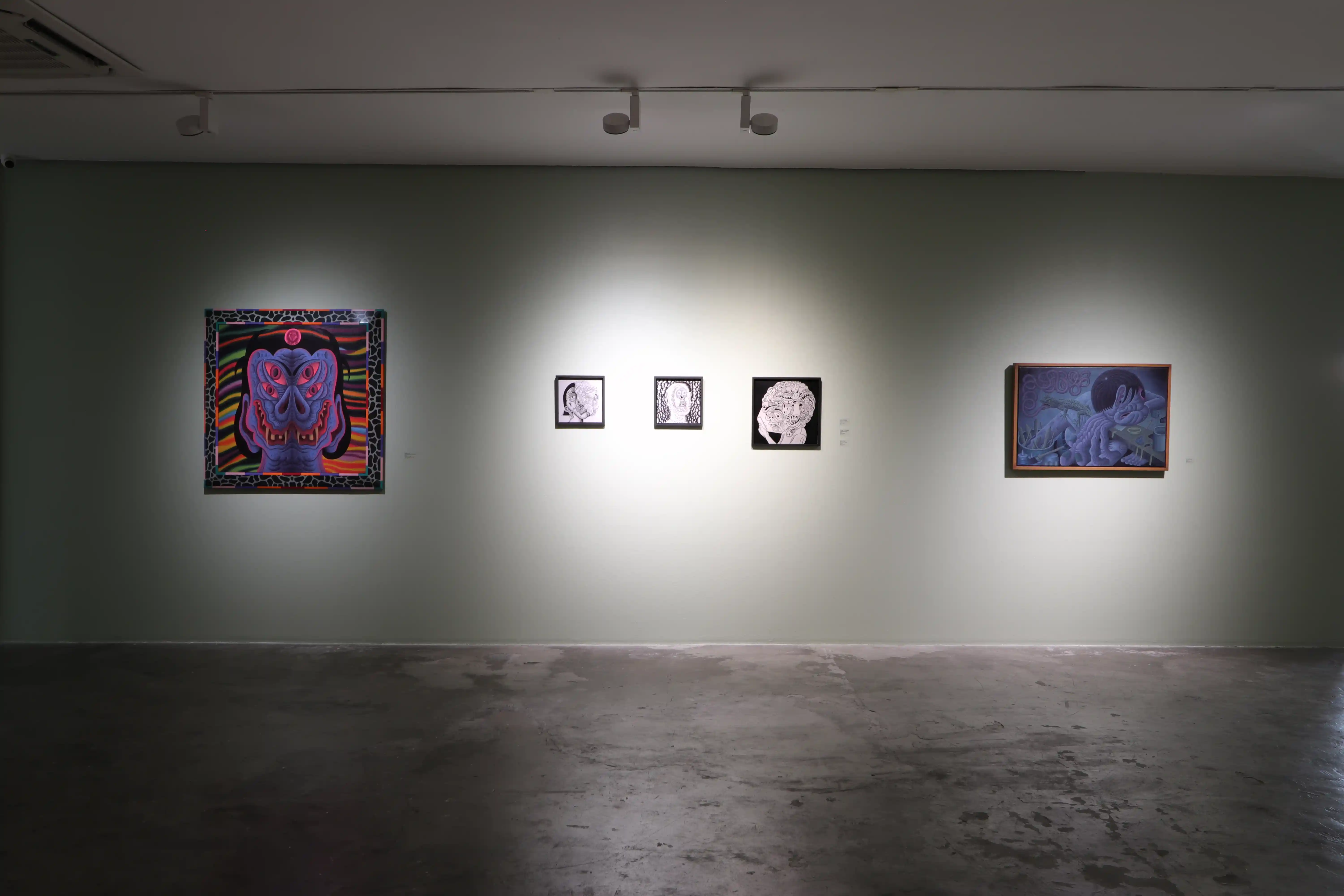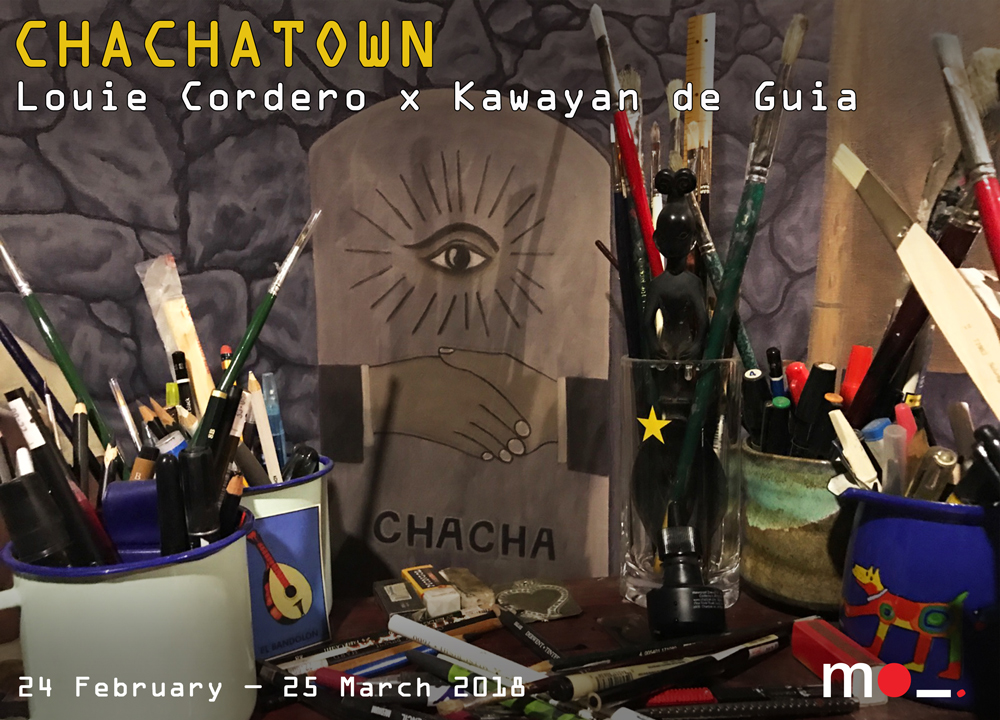.webp)
In his fourth solo show at MO_Space, opening October 19, Louie Cordero continues his
obsession with the ornate and the grotesque. A devotee of B movies, horror comics, kitsch, and
surrealist art, Cordero explores images of dread and dark humor in his new work.
Most of the paintings feature heads experiencing bizarre mutations and deformations.
Insomniac and paranoid, these figures seem locked in states of mental anguish—their thoughts
pressurized so much their heads and bodies erupt in waves of skin, lesions, and tumors. In
extremis, their faces even sprout faces.
These figures appear as representations of artistic consciousness straining to expel its
imaginings and anxieties—a creative drive pushing past the point of exhaustion and
constipation. A self-referential thread runs through the work: We find the artist in his studio
vexed to nightmare by the call of a house lizard (“Almost Dawn”); transfixed by a black vortex on
a smartphone screen (“The Choice”); and haunted by the childhood memory of being attacked
by a stray dog (“Midnight Paralysis”).
With skins resembling organs’ inner linings, Cordero’s figures turn their psychological turmoil
inside out. The surfaces bear the artist’s almost pathological attention to detail, repulsing as well
as attracting. The closer we look, the more the skins quiver, fold, and pucker up.
In this exhibit, Cordero’s colors are vivid and yet—compared to his earlier work—more subdued,
a change the artist credits to his move to an idyllic residence in the foothills of Cuenca,
Batangas.
Cordero also continues his experimentations with painted frames—as seen in “Homo Proteus
(The Understander of the Future),” “Omega Is the Alpha,” and “Gaiking Go (The Shadow of the
World)”—where the obsessive abstract patterns of his earlier phase seem to have been exiled
from the pictorial plane and spill out onto the margins.
The centerpiece of the exhibit is “Arise (Ghetto Politics and Its Infinite Cycle),” a diptych, which
uses the technique—adapted by comic books from the art of film—of setting up an establishing
shot on one panel, followed by a closeup shot on a succeeding panel. This montage technique,
this blending of painting and comic book conventions, is novel to Cordero. “Arise” is also a
departure in its less-subtle sociopolitical critique: It depicts the practice of local politicians who,
come election season, demolish perfectly passable roads so that they can make a spectacle of
“rebuilding” them and thereby win over voters.
In all, this exhibit presents old and new directions for Cordero, pointing perhaps to further
possibilities: a convergence of personal and sociopolitical comorbidities.
--Joe Bakal
About the Artist
About the Artists

Louie Cordero was born in 1978 in Manila, Philippines and is currently based in Cuenca, Batangas. A graduate of the College of Fine Arts at the University of the Philippines and held a residency in the United States at the Vermont Studio Center (2003). He’s a recipient of numerous awards including the Thirteen Artists Award from the Cultural Center of the Philippines (2006). His work has been exhibited at Sonsbeek ’16 transACTION, Netherlands (2016); the Open Sea exhibition at Musée d’Art Contemporain de Lyon, France (2015); World of Painting, Heide Museum of Modern Art, Australia (2008); Singapore Biennale (2011); the 14th Jakarta Biennale (2011); and PANORAMA, Singapore Art Museum (2012).
His work has been exhibited in the Philippines, Jakarta, Thailand, Denmark, Berlin, the Netherlands, France, Australia, and the United States.
Related Exhibitions
About the Artists
About the Artist
Louie Cordero was born in 1978 in Manila, Philippines and is currently based in Cuenca, Batangas. A graduate of the College of Fine Arts at the University of the Philippines and held a residency in the United States at the Vermont Studio Center (2003). He’s a recipient of numerous awards including the Thirteen Artists Award from the Cultural Center of the Philippines (2006). His work has been exhibited at Sonsbeek ’16 transACTION, Netherlands (2016); the Open Sea exhibition at Musée d’Art Contemporain de Lyon, France (2015); World of Painting, Heide Museum of Modern Art, Australia (2008); Singapore Biennale (2011); the 14th Jakarta Biennale (2011); and PANORAMA, Singapore Art Museum (2012).
His work has been exhibited in the Philippines, Jakarta, Thailand, Denmark, Berlin, the Netherlands, France, Australia, and the United States.

Related Exhibitions

Share






































